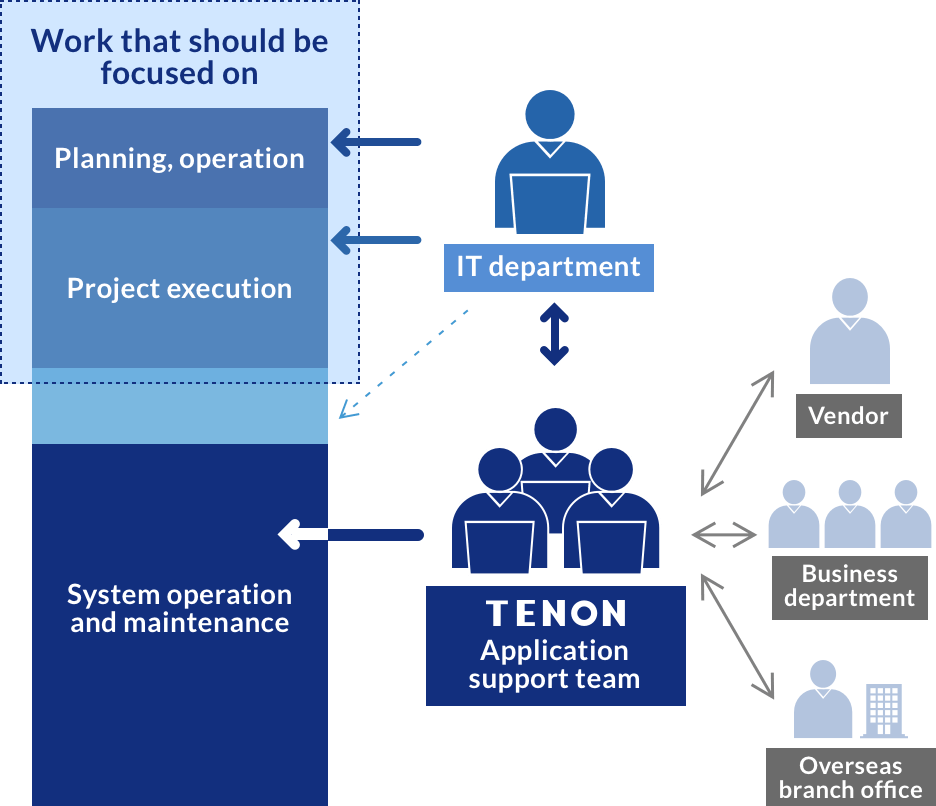Local System Operation and Maintenance Services for EDI, etc.
- TENON’s commitment
- The issues customers face
- Key points in solving issues
- Overview of our service
- Uniqueness and advantages
TENON’s commitment
Tenon provides operation and maintenance services related to both the system and business aspects of local systems, including EDI, EAI, WMS, BI, forms, and rebate calculation. Our focus is second-level support work that cannot be resolved through general help desk work or software product maintenance work, and that targets functional improvement/extension, troubleshooting, and service management including Q&A.
In bridge communication between global companies’ Japan offices and overseas head offices or branch offices by our bilingual consultants, we have a track record that exceeds 30 companies. In the role of support for IT departments, we familiarize ourselves with user departments and provide services under the motto of services that do not interrupt customers’ operations.
The issues customers face
For global companies in particular, even as centralization and consolidation of SAP-based enterprise business systems advances worldwide, customers face the following issues related to the operation and maintenance of local systems specific to Japan.
- Companies are unable to secure in-house human resources possessing the experience and skills to operate and maintain local systems across a wide range of business and technical aspects
- Companies have local systems indispensable to business continuity in emergencies, and risk an inability to formulate timely provisional countermeasures or perform system restoration in the event of serious troubles that could interrupt business
- Companies are unable to prepare structures for timely updates to operating systems, DBMSs, networks, etc. in accordance with shared global IT security policy
- For reasons including language issues, user departments alone are unable to accurately carry out coordination with systems under global management when system modification is required to accommodate new work, expansion of business partners, organizational consolidation, legal revisions, etc.
- IT departments wish to be freed from system operations work such as troubleshooting in normal operation, so as to focus on planning and management work
Key points in solving issues
Solving the above-mentioned problems requires building a second-level support team system that meets requirements including the following, and carrying out bridge communication between user departments and the global team.
- Possesses insights into the varied local systems seen in global companies (EDI, EAI, WMS, BI, forms, etc.) and understands client companies’ unique local systems
- Has knowledge of IT technologies (Java, operating systems, DBMSs, networks, web applications, etc.) used in local systems, which are often proprietary
- Possesses insights into enterprise business systems and interfaces, including SAP, that are placed under global management and are subject to linkages
- Possesses or is actively acquiring knowledge of client companies’ industries and businesses
- Is familiar with the IT methodologies and communication rules of global companies
- Is able to engage in business communication in Japanese and English
- Is able to work closely with customers toward recovery in the event of serious troubles that could cause suspension of business

Overview of our service
Our operation and maintenance service for EDI and other local systems comprises the following three services.
Troubleshooting
We perform recovery from system troubles originating in system failure, operational errors, and errors on the part of business partners. Working on the basis of incident reports from user departments and failure notifications from systems, we undertake tasks that include assessment of failure status, identification of causes, planning of provisional response, support for execution of provisional response, and planning of permanent response. For global companies, we act on behalf of user departments to communicate in English with overseas head offices and branch offices.
Service management
We respond to ad hoc inquiries separate from troubleshooting, including Q&A involving system operation, support for adapting to new products and new business partners, and support for shipping date adjustment during the New Year, Golden Week, Obon, and other long holidays. We provide support during the execution of operations by user departments, including the proposal of solutions to requirements.
Functional improvement/extension
We respond to requests for improvement and extension of system functions to accommodate changes in work processes associated with new business, new products, or business partners; organizational consolidation; legal revision; etc. We perform tasks including checking and organization of requirements, drafting of solutions, system implementation, user testing support, production migration, and production operation support. When linkage with back-end SAP or other enterprise business systems of global companies is required, we undertake coordination with overseas teams, implementation of testing, and other tasks through communication in English.
Uniqueness and advantages
Our EDI and other local system operation and maintenance services contribute to stable operation, improvement, and extension of customers’ SAP systems through the following unique points and advantages.
- Utilization of a track record of service provision to about 50 companies, and associated knowledge
- Experience in the provision of Japanese and English bilingual support to over 30 global companies
- Flexible adjustment of contracted man-hours through remote service
- A team structure that includes a number of experienced staff members with over 20 years experiences in the field of enterprise business local systems
- Expertise in enterprise business peripheral systems (EDI, EAI, WMS, BI, forms, rebate calculation, etc.)
- Expertise in SAP linkage technologies
- Knowledge of pharmaceutical, medical device, apparel, and other industries and business
- Deep understanding of the IT methodologies of global enterprises

